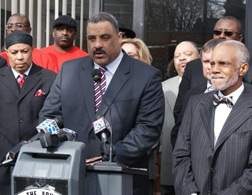The Ladder
One of the hard questions at the root of Ricci v. DeStefano, the reverse-discrimination case before the Supreme Court, is this: Why did white firefighters, as a group, score higher than blacks and most Hispanics on the promotional exams?
In a deal the city reached with the union, the tests were weighted so that 60 percent of each score was based on written questions and 40 percent on oral ones. Both parts of the exam were highly technical, designed to test memorization from classes and books rather than leadership or on-the-ground skills. The tests are under seal because of an agreement between New Haven and the private company that developed them, though you can read a transcript of a city hearing about the nature of the test here. The questions also focus only on fire runs, though the vast majority of the calls that come into the department are for emergency responses, like medical calls.
The consulting company that the city hired to write the exams based them on interviews with officers and the chief of the New Haven department, job questionnaires, and 1,200 pages of reading material. The reading was later announced along with the date of the test, giving applicants a sense of what they should study. But Tinney says that white firefighters had access to this information earlier—through a "network"of friends, family, instructors of the extra training courses they'd taken, and connections at testing companies. If he's right, it's a subtle form of advantage. But every point on the test mattered: The applicants who took the test were competing against one another rather than simply trying to pass. The city's rules dictated that the 15 available promotions would go to the top scoring applicants—13 percent of the total number of firefighters who took the 2003 tests.
To the Firebirds, because the tests were based on the fine print of fire manuals rather than on-the-ground smarts, they were simply a bad way of judging a firefighter of any race. "Just because you scored three more points than I did, that doesn't make you a better officer," said Wayne Ricks, a black veteran of 27 years who scored 69.9833 on a lieutenant's test issued before the exam that's the source of contention in Ricci v. DeStefano. (On that test, a score of 70 was needed to make the promotion list.) Ricks argues that resourcefulness and interpersonal skills are as important as book learning, especially for the emergency response calls that are most firefighters' daily fare. "You need to be good with people, especially when you go into the communities and there might be a language barrier or a culture barrier. Not everyone is comfortable going into 'the hood,' " he said, making air quotes.
The plaintiffs and their supporters have a simpler explanation for the test scores: The firefighters who did best are the ones who studied hardest. They deserve the promotions the city denied them. Frank Ricci has understandably gotten an extra dose of sympathy because he is dyslexic, quit a second job to make time to study, and hired a tutor at his own expense.
William Gould, the white captain we talked to, understands why Ricci and his fellow plaintiffs feel cheated. "It's not like the whites were privy to information weeks before the blacks or Hispanics, that's just ludicrous, that's stupid." Gould took extra training courses that he paid for out-of-pocket before he got his promotions. That doesn't mean, he says, that he had an unfair advantage. "I know the other side will say I've probably been fortunate or blessed or whatever you want to say, but that's not the case. We tested against everybody."
At the same time, Gould's description of the efforts of the high scorers to ace the test isn't that different from Tinney's. "The guys who are really inspired to get promoted would find out what was on the last exam and they would go and find the materials and they would buy them and study, but study at their own pace."
As one Hispanic quoted anonymously by the New Haven Independent put it, the test favored "fire buffs"—guys who read fire-suppression manuals on their downtime and paid test-manual writers to come to New Haven to speak. Is this the best way to choose the leaders of a municipal fire department—the best memorizers win? Or to frame the question as federal civil rights law would: Was New Haven's promotional exam more closely related to performance on the job than any of the less discriminatory alternatives? How did the city come up with this test, anyway?
Click here to read Part 4: Is there a better way to decide who gets promoted?
